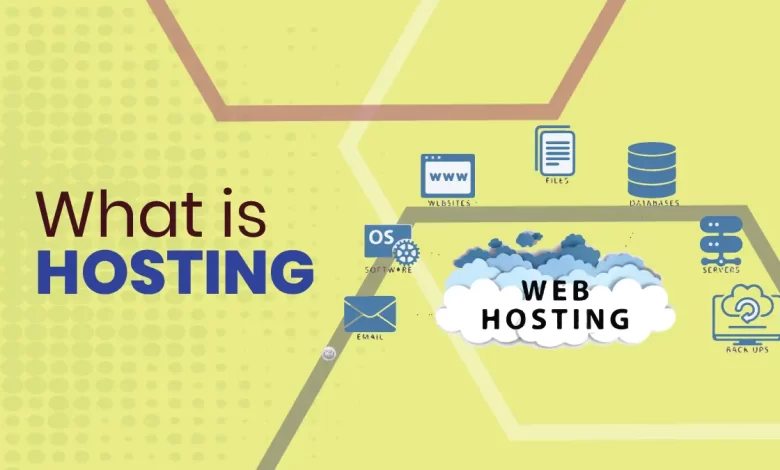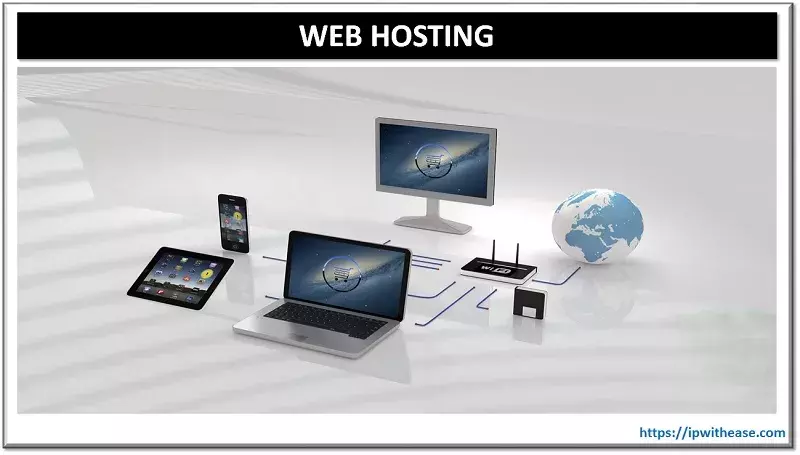What is hosting? | Hosting for website | Web Hosting Explained for Beginners

Table of Contents
1. What is hosting?

Hosting (also known as web site hosting, web hosting and webhosting) is the business of housing, serving and maintaining files for one or more web sites. More important than the computer space provided for Web site files is a fast connection to the Internet. Most hosting services offer connections over T-Carrier system lines. Typically, an individual business hosting its own site will require a similar connection and will be expensive.
Using a hosting service allows many companies to share the cost of a faster Internet connection to serve the files. Many Internet access providers, such as America Online, provide customers with free space for a small Web site that is hosted by one of their computers. Geocities is a web site that provides the same free space for the web site to the registered visitors. Although these services are free, they are also very basic.
2. History of Hosting

Until 1991, the Internet was restricted to access only “…for research and education in science and engineering”. And it was used for email, Telnet, FTP, and USENET traffic—but only a small number of web pages. The World Wide Web protocols were just written and there would not be a graphical web browser for Mac or Windows computers until late 1993. Even after some opening up of Internet access, by 1995 the situation was confusing [Explanation needed].
To host a website on the Internet, an individual or company will need its own computer or server. As not all companies had the budget or expertise to do so, web hosting services began to offer users’ websites to be hosted on their own servers, without the client having the necessary infrastructure to operate the website. Needed to be the owner. Website owners, also known as webmasters, will be able to create a website that will be hosted on the web hosting service’s servers and published to the web by the web hosting service.
3. What are the types of hosting?
Internet hosting services can run a web server. So in this scope of web hosting services varies a lot.
1. Shared Web Hosting Service
A shared web hosting service is a web hosting service where multiple websites reside on a single web server connected to the Internet. This is generally the most economical option for hosting, as the total cost of server maintenance is spread across multiple clients. Website by choosing shared hosting.
2. Allows the client to be the web host itself

Resellers may operate under any combination of these listed types of hosting, for individual domains, depending on who they are associated with as the reseller. Reseller accounts can vary greatly in size: they may have their own virtual dedicated server to a colocated server. Many resellers offer almost identical service to their provider’s shared hosting plan and provide technical support themselves.
3. Virtual Dedicated Server
Also known as a Virtual Private Server (VPS), divides server resources into virtual servers, where resources can be allocated in a way that doesn’t directly reflect the underlying hardware. VPS will often be allocated resources based on one server to many VPSs relationship, however virtualization may be done for a number of reasons, including the ability to move a VPS container between servers.
4. Dedicated Hosting Service
A dedicated hosting service, dedicated server or managed hosting service is a type of Internet hosting in which a client leases an entire server that is not shared with anyone else. It is more flexible than shared hosting, as organizations have complete control over the server(s), including the choice of operating system, hardware, etc.
5. Managed hosting service

The user gets his or her own web server but is not permitted full control over it (user is denied root access for Linux/administrator access for Windows); however, they are permitted to manage their data via FTP or other remote management tools. The user is disallowed full control so that the provider can guarantee quality of service by not allowing the user to modify the server or possibly create configuration problems.
6. Grid Hosting
This form of distributed hosting occurs when a server cluster acts like a grid and is made up of many nodes.
4. Classification of Hosting
1. Small Hosting Services

The most basic is web page and small scale file hosting, where files can be uploaded via File Transfer Protocol (FTP) or a web interface. Files are usually delivered “as is” or over the web with minimal processing. Many Internet Service Providers (ISPs) provide this service to customers free of charge. Individuals and organizations can also get web page hosting from alternative service providers. Free web hosting service is offered by a variety of companies with limited services, sometimes supported by advertisements, and often limited compared to pay hosting.
2. Large Hosting Services
Many large companies that are not Internet service providers need to be permanently connected to the web in order to send email, files, etc. to other sites. The Company may use the computer as a website host to provide a description of its goods and services and facilities for online orders. These features allow clients to write or install scripts for applications like forums and content management. Also, Secure Sockets Layer (SSL) is commonly used for websites that want to keep data more secure.
5. How Web Hosting Works?

- In short, companies like us rent services and technologies to host your websites on the Internet. Once you have selected your domain name and signed up for a hosting plan, your website is available on the Internet.
- When you use web hosting services, your web host is responsible for ensuring that your server is up and running. Not only that, but it is also the job of a host to prevent any security breach and store all your files, assets and databases on the server.
- If you choose one.com to host your website, we provide a number of other services to improve and protect your site.
6. What are the essential features of web hosting?
Any website that wants to be put on the Internet must be hosted on a web server. A web server can refer to either hardware or software that helps deliver content that can be accessed via the Internet. There are several web hosts to choose from and finding the right web hosting package can be a confusing process.
1. Storage/Disk Space
A web hosting account has an allocation of storage/disk space that can be rented on the server. The amount of storage will include all content of web pages, any graphic or other media content that may be used on the pages, any files that are available for download to visitors and any space that may be used for email. Can go.
2. Bandwidth/Data Transfer
These two functions are an important factor to consider when choosing a reliable web hosting. If we see like they are similar but different aspects of the same process that work hand in hand. Data Transfer is how much data is being transferred on monthly basis.

3. Uptime
It is one of the most important features of a reliable web hosting provider. Guaranteed uptime means that a website is guaranteed to be up and available to visitors at least 99.9 percent of the time. If you want this guarantee should include network uptime, server uptime, web server and service uptime as well as 24/7 support.
4. Domain Name
A domain name is a unique name and address on the World Wide Web. Domain registration is the process by which an individual or a company secures a website domain. Once the domain registration is complete, the domain name is purchased and available for use for a specified period, usually one year, and can be extended at any time.
5. Support
A reliable web hosting provider should have 24/7 technical support available. Receive quick answers to support tickets and immediate help via chat service or telephone support if any problems occur.
7. Benefits of hosting

- Low Cost: The lowest price is one of the main benefits of shared hosting.
- Ease of use: The site is easy to set up and maintain through a system of “click and drag” to facilitate this process.
- Technical Support: Guaranteed by most companies that provide the service of web hosting, assisting with the resolution of questions and problems with website, server and configuration requirements.
- Resources: A collection of resources that can grow as the site demands.
8. What is the difference between Domain and Hosting
As we know that the Domain names and web hosting are two different things. But there are many companies which sell both domain and hosting. For example – GoDaddy, it is the largest domain registrar in the world, but it also provides hosting facility in addition to domain. When it comes to quality domain names and web hosting providers, the first name that comes to mind is DomainRacer. They are very well known for providing web hosting and domain name services.
DomainRacer provides all type of domain extensions .com, .net, .in, .uk, .it, .co.uk, .me, .xyz, .scot, .de, .com.au, .tv etc. You can select the domain name for your website with DomainRacer. Along with the advanced web hosting plans, they will also give you .com and .in domain names for free. This web hosting and domain service is available at an economical price. If we put simply: A domain name is like your home address; whereas web hosting, rooms in your house are where you keep your stuff. If we talk about the address is the domain name which is the address of your website and for storage, computer hard disk, memory etc.
9. Conclusion
Web hosting is the backbone of your website, and provides the complete resources on which to run your website. Choosing the right web hosting provider is very important to ensure that your website never goes down and always performs error free whenever anyone visits it.
10. FAQ
1. What is meant by hosting?
Hosting, in its most general sense, is a service through which storage and computing resources are provided to an individual or organization for the accommodation and maintenance of one or more websites and related services.
2. What are the types of hosting?
Hosting service is often misunderstood by even the most experienced developers! Not only are there many hosts in the market, but there are also four types of hosting: shared, VPS, dedicated, and cloud.
3. What’s the difference between a server and a host?
Simply put, a host is a device that connects to a computer, it can be a computer, laptop, tablet or smartphone. Server is a piece of hardware or software that can provide services to other devices. It may also provide services to network-connected programs.
4. Why Do We Need Cloud Hosting?
Cloud hosting makes apps and websites accessible using cloud resources. Unlike conventional hosting, solutions are not deployed on a single server. Rather, a network of connected virtual and physical cloud servers hosts the application or website, ensuring greater flexibility and scalability.
5. What is shared server hosting?
A shared web hosting service is a web hosting service where multiple websites reside on a single web server connected to the Internet. This is generally the most economical option for hosting, as the total cost of server maintenance is spread across multiple clients.
6. Is the Hosting Service Important?
A bad web host will mean that your website is more likely to be damaged by being unavailable or disrupted. It is common knowledge that a site with poor web hosting may face problems as the host will not protect the website. If your site goes down you could lose customers, lose revenue and lose their trust.
7. How does web hosting help business?
Firstly, it allows the customer to add the products they like and then review all of them and order the desired ones from one place. Second, it offers hassle-free shopping with a secure checkout process. Easy integration with payment gateways helps customers place orders directly.
8. Is hosting a website from home safe?
It is a security risk. Running a server on your home network is a huge security risk, as hosting it at your home exposes your public IP address to the world. This leaves you open to malware being installed on the host computer or DDoS attacks that can completely shut down your home Internet.




